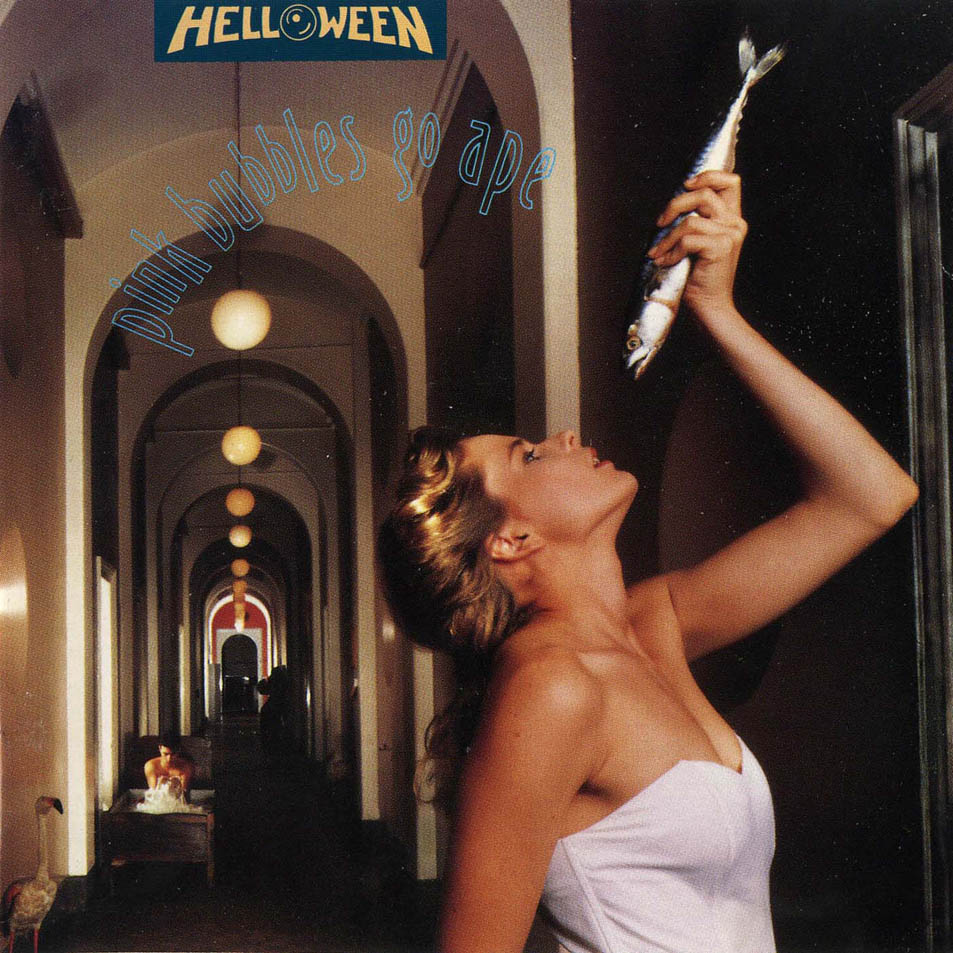 The power of Christ Impels you! This album completely surprised me, as I’d always classed Impellitteri as one of the flock of 80s shred metal bands: long on guitar sonatas, short on songwriting ability or actual hooks. Venom proved to be one of the most powerful, focused, and concise albums of its year. The LD50 for this album is very low.
The power of Christ Impels you! This album completely surprised me, as I’d always classed Impellitteri as one of the flock of 80s shred metal bands: long on guitar sonatas, short on songwriting ability or actual hooks. Venom proved to be one of the most powerful, focused, and concise albums of its year. The LD50 for this album is very low.
What to expect? Savagely fast and technical riffwork, which runs all up and down the neck while still remaining tight and groove-laden. Guitar solos that throw away any notion of “taste”, “musicality”, or “wearing pants” and just eviscerate the listener with almost unimaginably fast blurs of notes. Soaring vocals that bend and weave around the guitar lines. A bass and drum rhythm backdrop that crushes you hard enough to undergo atomic fusion.
With ten songs that are all around three minutes long, this is a shred metal album LARPing as a punk rock LP. There’s an immediateness and directness to the music that can’t really be compared to other shred metal. This is the anti-Yngwie. It doesn’t get right to the point – it starts at the point, from the moment the needle touches down. The songs fly by with alarming efficiency, verses and choruses and solos appearing and evaporating just at the point where they’ve got you intrigued.
Chris Impelliteri’s guitar sound is like the glass shards from a dirty window. Smooth, glassy, but also throat ripping, full of points seeking out the body’s softness. His tone is so thick and suffocating that he must have quadtracked the rhythm parts, despite the agility and tightness of all these songs.
And the tempo is very fast: the album strings so many uptempo songs together that the thirty-three minute runtime soon seems like a necessity, before the listener taps out. “Venom”, “Empire of Lies”, and “Nightmare” are progress at a gallop. “Face the Enemy” is perhaps the album’s slowest song, a Virgin Steele style uptempo rocker with a big chorus.
“Domino Theory” is a rolling thunderstorm of a track that might be my favourite from Impellitteri’s work here. “Jenovah” and “Rise” have hard-edged choruses with some surprising progressive sensibilities in their construction. The album closes with “Time Machine” and “Holding On”, which are equally ominous but perhaps more melodic. The European edition has a bonus track called “Rock Through the Night”, which is fine on its own, but takes the album to the point where there’s too much of the same and it starts to become a bore.
But Impellitteri astonished me with what they accomplished on this album. A shred metal album that you can listen to in one sitting, and still want more…wasn’t this always the endpoint for the genre?
 What happened here?
What happened here?
Helloween’s fourth album is stupid and bad, and it’s stupid and bad in a way that bands are normally immune to. Pink Bubbles Go Ape would have made sense coming from a solo artist. All artists have THAT period, where they snort a rail of coke laced with rat droppings and make a concept album about socks disappearing inside the lint dryer. But how the fuck did five members all agree to sign off on this inanity?
To recap, Helloween were on an incredible hot streak through 1985-89. Walls of Jericho and both of the Keeper albums (notice that I make no mention of a third) wrote the book on Teutonic power metal. After touring with Exodus and Anthrax, and getting airplay on Headbanger’s Ball, they finally seemed on the verge of a big break.
Then principle songwriter Kai Hansen left the band. His final composition on a Helloween disc, “I Want Out”, was apparently less a catchy tune than a dire prognostic. Immediately, the band went into a tailspin, with drummer Ingo Swichtenberg’s schizophrenia becoming worse and vocalist Michael Kiske now harboring delusions of reinventing the band as a pop group.
Three years later, we got this, and the band’s chances at becoming a mainstream metal act ended in a fit of pure absurdity. It’s one thing to shoot yourself in the head. Helloween managed to shoot itself with one of those joke store pistols with a spring-loaded *BANG* flag.
The album is either hard rock music that isn’t very good, or comedic lyrics that aren’t very funny, and usually both at the same time. Almost none of it sounds like power metal. “Kids of the Century” makes an effort at rocking hard, before confessing partway through “yeah, I got nothin'”. “Number One” is a Weikath song from the early 80s. It’s no mystery why it never appeared on a past Helloween, but why it’s on this one is mystery aplenty. “Goin’ Home” and “Heavy Metal Hamsters” are like special-needs glam rock, if such a thing existed. I’m imagining huge teased 80s hair, hidden beneath a SPED helmet.
In a final surrealistic touch, the only songs that sound like old Helloween (“Somebody’s Crying” and “The Chance”) were penned by new guitarist Roland Grapow. Both of these songs are great, particularly the second one, which has lots of soaring guitar harmonies and a dog-whistle high note from Kiske. Grapow was a thirty year old car mechanic, drafted to fill the gap left by Hansen’s department, and “The Chance” reflects the optimism at such a stroke of luck. Unfortunately, Helloween was and is a dysfunctional band (even without Kiske), and in ten years he’d probably relate more to “I Want Out.”
“Mankind” wastes a great Queensryche atmosphere with a goofy chorus, and the final ballad “Your Turn” is saccharine gloop. It’s nearly as bad as “A Tale That Wasn’t Right”. Put this in your car’s fuel tank and your ride would never work again.
What’s the French expression? Folie à deux? A bunch of people suddenly going mad (or ape, as the case may be?) It basically put a spoke in the band’s wheel, and set off events that would leave most of Helloween’s lineup getting fired or dead. It’s a tragedy, masked as a comedy.
 “Raw” is a dangerous aspiration to have as a musician. It’s supposed to mean artistic freedom, and the throwing away of artifice and pretension. All I can think of is that raw things give you salmonella.
“Raw” is a dangerous aspiration to have as a musician. It’s supposed to mean artistic freedom, and the throwing away of artifice and pretension. All I can think of is that raw things give you salmonella.
Rob Zombie’s puzzling third album takes all the electronics and danceable aspects of his past work and replaces them with…nothing much. Bare fragments of grinding riffs and Iggy Pop vocals drive the album. Not a single track sounds like it could have been on Hellbilly Deluxe (although Hellbilly Deluxe has a song called “How To Make a Monster” that sounds like it could have been on this one) and even his vocals sound totally different. It’s was a bold move to throw out every aspect of his previous sound, and a curious one, as his previous sound was mostly working for him.
But there’s an explanation: his film career.
His directorial efforts almost deserve a documentary in their own right. Basically, 2003’s House of a Thousand Corpses had a sweetheart of a deal that he obliterated with a poorly chosen joke on a TV show (or something), and his funding disappeared with the film half shot. Rather than cancel the film, he somehow figured out how to get the rest of the footage just by shooting stuff for free around his house. Sounds like a recipe for a shit sandwich, but when he watched the final cut, he actually liked the zero-dollar shots better, and his films have essentially relied on that approach since.
I imagine he wanted to try the same approach with his music. Just throw together some stuff with a live band and see what happens. Well, something happened. I don’t think he covered himself with glory here, but it has some strong moments, particularly in the deeper cuts.
After an arty piano tribute to the Halloween theme called “Sawdust in the Blood”, “American Witch” kicks off to unimpressive results. With a plodding tempo and a chorus that sounds like it was made up on the spot, it’s just a boring song. A lot of tracks here are like that. “Ride”, “The Devil’s Rejects”, “17 Year Locust”. None of them are complete throwaways, but they just don’t have enough actual content to sustain your interest. It’s like being at a party with twenty people, but the host only bought enough snacks for ten.
Then there’s the songs that provoked revulsion among the Zombie faithful. “Foxy Foxy” is kind of cute. “Death of it All” is an all-acoustic track that I like. “The Scorpion Sleeps” sounds like a fucking beer commercial. The two best songs are “Let It All Bleed Out” and “Lords of Salem”. The former has the energy and the latter has the heavy. Either of those songs would have been a good direction to explore more fully. Rob Zombie’s never been comfortable playing all-out metal, but I wish he’d get comfortable, because the closer he gets the better he sounds.
Well, it’s an experiment, which guards it against criticism in a way. This is just a lab experiment, to be accepted if it works, and flushed if it doesn’t. I think it does a little of both.
 The power of Christ Impels you! This album completely surprised me, as I’d always classed Impellitteri as one of the flock of 80s shred metal bands: long on guitar sonatas, short on songwriting ability or actual hooks. Venom proved to be one of the most powerful, focused, and concise albums of its year. The LD50 for this album is very low.
The power of Christ Impels you! This album completely surprised me, as I’d always classed Impellitteri as one of the flock of 80s shred metal bands: long on guitar sonatas, short on songwriting ability or actual hooks. Venom proved to be one of the most powerful, focused, and concise albums of its year. The LD50 for this album is very low.

